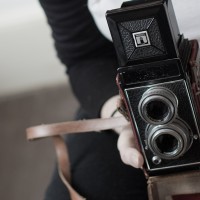
The cameras that we use today, the ones that we think of as digital. They’re not quite as digital as they wish they were.
Oh, they’re cameras, yes, definitely, they paint pictures with light and everything, but they’re not digital. Our ‘digital cameras’ so far have been film cameras that have been adapted for digital sensors. One expert claims that the real world of digital photography awaits.
In the next five years, we’ll see f/0.5 lenses, digital zoom that’s better than its optical equivalents, extremely high sensitivity sensors, and ludicrously high dynamic range.
Ladies and gentlemen… we present the revolution of the digital camera…

The days of films have been numbered - and flat digital sensors might be next against the wall...
You see, very often it’s easier to adapt something that you have and already know and understand to integrate new technology than it is to re-invent the whole genre for your new development. And in many ways, that’s just what has happened with camera technology. When film cameras were first being used, it was important that things were flat. It made them easier to transport. And there’s been a huge hang over from that obsession with the flat as cameras have become more widely used, and entered into the digital realm. Digital sensors in cameras are flat.
And when you stop to think about it for a minute, that’s a bit, well, silly. Our eyes, which at the moment are definitely more powerful than a camera lens, are curved. So why aren’t we making curved sensors? Oh yeah, because we’ve always made them flat. (Mmhmm, we’re having a bit of a ‘No, we’re not going to sail off the edge of the earth moment here,’ aren’t we?)
Can we make curved sensors? Well, Gary Sutton reckons that we can.
Let’s take a look at what he has in mind…
